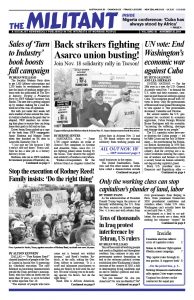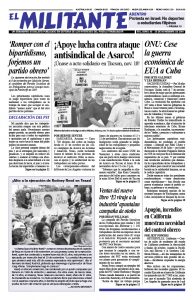Tens of thousands of working people and youth in Baghdad and throughout southern Iraq continue to join anti-government protests demanding an end to the sectarian political system established after Washington’s bloody invasion of the country in 2003, a halt to deteriorating living conditions and an end to Tehran’s political and military intervention.
“Are you Iranian? No. Are you American? No. Are you Baathist? No? Are you Iraqi?” chanted demonstrators camped out in Baghdad’s Tahrir Square, condemning the intervention of Tehran and Washington in Iraq, and the tyrannical rule of Saddam Hussein’s Baathist Party that was based among Iraq’s Sunni minority.
After Saddam Hussein was overthrown in Washington’s 2003 war and invasion, the U.S. rulers sought to impose a regime loyal to their interests, setting up a sectarian political system that ensured the predominance of capitalist parties based among the Shiite population. It divided government branches and top positions on a sectarian basis, guaranteeing that the most powerful post of prime minister goes to a Shiite.
But this setup has not produced a strong government for the country’s ruling capitalists. They depended in part on Tehran-backed militias to defeat the reactionary Islamic State after it seized control of parts of Iraq and to push Kurdish-led forces out of Kirkuk in Iraqi Kurdistan in 2017. Today they rely on the same forces to carry out murderous assaults on anti-government protesters.
Since the protests started in the beginning of October, over 280 people have been killed and more than 12,000 injured by government-backed forces. Police, the military and Tehran-backed paramilitary groups have used live ammunition, rubber bullets and tear gas against demonstrators.
The Iranian rulers organize militias in Iraq alongside the military forces they back in Lebanon, Syria and Yemen, to extend their clout across the region and to threaten Israel.
Protesters across southern Iraq have targeted buildings linked to the Tehran-backed militia groups like the Popular Mobilization Forces. The Iranian Consulate in Karbala has been attacked four times since early October.
Since Oct. 25 protesters have remained camped out in Baghdad’s Tahrir Square. Many others have joined them during the day expressing solidarity, bringing home-cooked meals, music and offering free haircuts. But at night assaults have increased against those at the camp by Iraqi-government and Tehran-backed forces.
“I’m doing it … for dignity,” 29-year-old Al Hamsa Hamid told Al Jazeera at the Tahrir Square camp. “I don’t want militias in my country,” he added. Hamid fought Islamic State serving in the Iraqi Counterterrorism Forces, participating in the recapture of the city of Fallujah from the sect. Now he volunteers as one of the “goalies” at Tahrir Square, that stop and neutralize tear gas canisters fired at protesters by security forces.
Iraqi state television reported that authorities ordered “explosive experts” to detonate a bomb under Sinak bridge Nov. 7 to drive back protesters trying to cross into the Green Zone where government offices are located.
In Basra, masked men attacked anti-government protesters Nov. 6, killing five and wounding about 120 people, according to medical officials. The day before, protesters seized armored vehicles from the 36th armored brigade of the Iraqi army.
In early November the government reimposed an internet blackout that had been in effect for two weeks in October.
In the country’s south, sit-ins kept schools and government buildings shut in Nasiriyah, Kut, Hillah, Diwaniyah and Najaf, reported Agence France-Presse.
Authorities have threatened to sack school and college heads in Mosul, the country’s second-largest city, located in the predominantly Sunni area in the north of the country if they allow any students to organize protests there, reported Rudaw.
Iraqi Prime Minister Adel Abdul-Mahdi has now pulled back from his earlier announcement that he would resign, after the Iranian government insisted he stay in office. The prime minister now promises to announce new electoral reforms in the “coming few days.”
“These are just words,” 30-year-old Noor Mohammed told Al Jazeera in Tahrir Square. Mohammed has been unable to get a job and wants to see Mahdi quit. “Is this how we’re repaid?” he asked.
“We stood up for our country and fought IS. … We deserve to be ruled without corruption.” Washington has 5,200 troops stationed in Iraq, part of the tens of thousands it deploys throughout the Mideast to defend its interests against rival capitalist powers.

